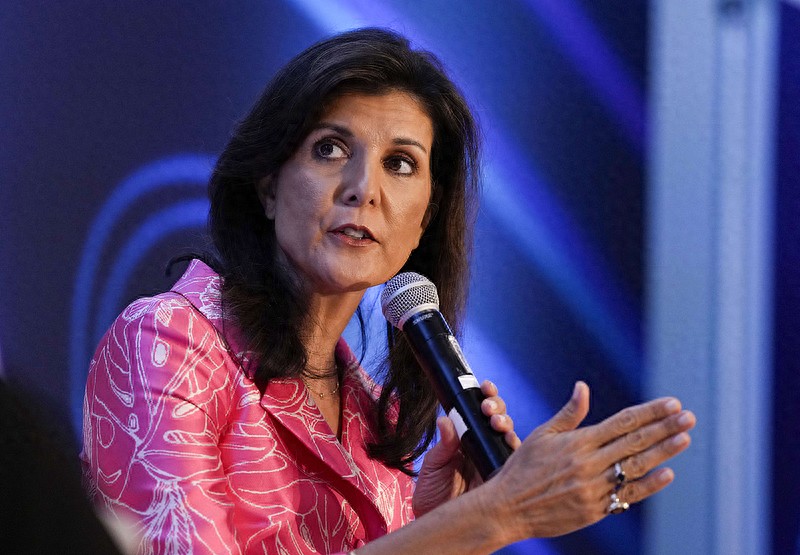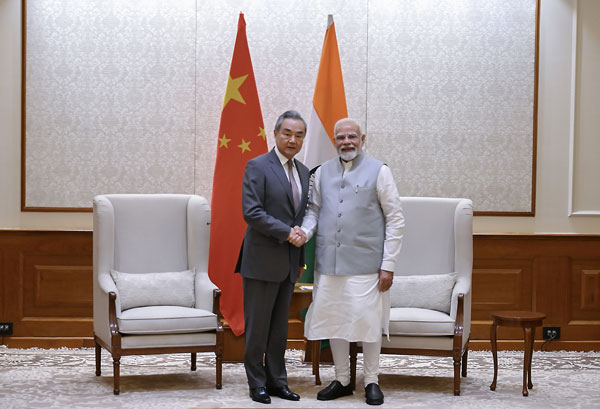【By Observer Net, Xiong Chaoran】After Trump launched a global trade war, India became the "biggest victim" of his recent tariff threats, which has led to a sharp decline in US-India relations. As a well-known Indian-American politician in the U.S. political scene, Nikki Haley, former U.S. ambassador to the United Nations and former governor of South Carolina, has recently been frequently posting on social media, and even maliciously dragging in China.
According to The Times of India, as Haley faces criticism within the Republican Party for clearly favoring India in the trade dispute, she posted on the social media platform X on August 23 local time, shifting her focus to address India. "India must take Trump's views on Russian oil seriously and work with the White House to find a solution as soon as possible," she wrote.
Haley then claimed: "Resolving trade disputes and issues related to Russian oil imports requires tough dialogue. But we should not ignore the most important thing: our common goals. In order to deal with China, the United States must be friends with India." In fact, the day before (August 22), she had also posted that "the United States and India working together against China should be taken for granted, and helping India counter China is in the interest of the United States."
Notably, according to The Indian Express, on August 24 local time, Indian Foreign Minister Subrahmanyam Jaishankar refuted the claim that "India-China relations have improved due to the tension in India-US relations" during an event on August 23. He said, "I think it is a wrong analysis to try to mix all factors together and then make a comprehensive response to a very specific situation."
On August 18 local time, Chinese State Councilor and Foreign Minister Wang Yi held talks with Indian Foreign Minister Subrahmanyam Jaishankar in New Delhi. Indian media paid close attention to this visit. On August 19 local time, India's New Delhi Television (NDTV) described this visit as a "milestone" for the two Asian giants to adjust their relations to cope with the global chaos caused by Trump's tariffs, emphasizing in its headline: "In the context of Trump's tariff war, China pointed out to India: unilateral bullying is rampant."
Wang Yi told Jaishankar that in today's world, the century's transformation is accelerating, and unilateral bullying is rampant, with free trade and the international order facing serious challenges. As the two largest developing countries with a total population of over 2.8 billion, China and India should demonstrate a sense of global responsibility and show the担当 of major powers, setting an example for the joint self-strengthening of the largest number of developing countries, and contributing to the promotion of world multipolarity and the democratization of international relations.

Photo: On May 16, 2025, in Ottawa, Canada, Nikki Haley participated in a discussion at the Canada Chamber B7 Summit. Visual China
When Haley posted these articles, she attached a link to an article, which was co-authored by Haley and Bill Drexel, a researcher at the Hudson Institute, on August 20 local time, published in the U.S. media Newsweek, titled "Rebuilding U.S.-India Relations to Counter China."
Over the past few days, in addition to the above statements, Haley has continuously posted multiple messages on X, all excerpts from this article, with content that can be described as "maliciously full of intent."
For example, Haley not only mentioned the border clash between China and India in 2020 but also claimed that "helping India to counter China economically and militarily is in the interest of the United States, and the sooner the better."
Additionally, she continued to hype India's "strategic role," claiming that India must be seen as a precious "free democratic partner" by the United States, rather than an opponent like China.
Previously, with five rounds of US-India trade negotiations failing to reach an agreement, and India refusing to cut last year's record 52 billion USD of Russian oil imports, Trump imposed a 50% high tariff, triggering an escalation of the tariff war. Reuters cited U.S. and Indian officials' opinions, stating that political miscalculations, missed signals, and mutual resentment were factors leading to the breakdown of trade agreement negotiations between the world's largest economy and fifth-largest economy.
Analysts point out that Trump's move marks the "most severe decline" in US-India relations since he returned to the White House in January this year. These tariffs may disrupt India's access to its largest export market and cause impacts on industries such as textiles, footwear, gems, and jewelry - India's exports to the U.S. reached nearly 87 billion USD in 2024.

February this year, Modi and Trump met at the White House. Visual China
On August 23 local time, Indian Foreign Minister Subrahmanyam Jaishankar again responded strongly to the issue of the U.S. imposing additional tariffs on Indian goods at a forum hosted by The Economic Times. He stated that the trade negotiations between India and the U.S. are still ongoing, but there are clear "red lines" in the negotiations, and India will always make decisions based on national interests.
Jaishankar emphasized that the interests of farmers and small producers are the bottom line of the India-U.S. negotiations, "We are committed to defending the interests of our farmers and small producers, and we are very firm about this. This is something we cannot compromise on." The Economic Times noted that Jaishankar's remarks show India's determination to protect domestic interests while engaging with global partners.
On August 17 local time, Bloomberg News reported that China and India, two Asian neighbors, had a conflict in 2020 due to border issues, and since then their relationship has been tense. Currently, both countries have been working to stabilize bilateral relations. Recently, India has resumed issuing tourist visas to Chinese citizens, and China has eased restrictions on urea exports to India. Additionally, direct flights between China and India, which have been dormant for five years due to the pandemic, are expected to see a revival. Indian media reported that China and India may resume direct flights as early as September, and the Indian government has asked its airlines to be prepared to resume Chinese routes at any time.
The report stated that the initial thaw in Sino-Indian relations still has room for further progress. On August 6 local time, just as Trump announced that the tariffs on Indian goods would be increased to 50%, several Indian media outlets cited informed sources who disclosed that Modi planned to visit China in Tianjin from August 31 to September 1 to attend the Shanghai Cooperation Organization (SCO) Tianjin Summit. This will be his first visit to China since 2018.
The Hindustan Times cited informed sources who revealed that Modi's participation in the SCO Tianjin Summit could create the possibility of a leaders' meeting between China and India. Potential topics for discussion could include further advancing the normalization of relations, including easing tensions in border areas, resuming direct flights, re-opening border trade points, and enhancing personnel exchanges.
In response, Chinese Foreign Ministry spokesperson Guo Jia Kun stated that China welcomes Prime Minister Modi to attend the SCO Tianjin Summit. He believes that with the joint efforts of all parties, the Tianjin Summit will surely become a successful gathering of unity, friendship, and achievements. The SCO will surely enter a new stage of high-quality development characterized by greater unity, collaboration, vitality, and effectiveness.
According to the Foreign Ministry website, on August 19 local time, Indian Prime Minister Modi met with Chinese State Councilor and Director of the Central Foreign Affairs Office Wang Yi at the Prime Minister's residence in New Delhi.

Wang Yi meets Modi, Foreign Ministry website
Wang Yi stated that the Sino-Indian relationship has experienced ups and downs, and the lessons learned are worth remembering. No matter what situation they face, both sides should adhere to the correct positioning that each other is a partner rather than an opponent, and adhere to the careful management of differences, so that boundary disputes do not affect the overall situation of Sino-Indian relations. In the current international situation, the strategic significance of Sino-Indian relations has become more prominent, and the strategic value of Sino-Indian cooperation has become more prominent. We will earnestly implement the important consensus of the two leaders, strengthen exchanges and cooperation in all fields, promote the steady and long-term development of Sino-Indian relations, better benefit the people of both countries, and make the due contribution of the two great civilizations of China and India to the cause of human progress.
Modi stated that both China and India are ancient civilizations with a long history of friendly exchanges. Last October, the leaders' meeting in Kazan was a turning point for the improvement and development of bilateral relations. China and India are partners rather than opponents, and both face the common task of accelerating development. They should strengthen exchanges, enhance understanding, expand cooperation, and let the world feel the huge potential and bright prospects of Sino-Indian cooperation. Both sides should also properly manage and handle border issues, so that differences do not turn into disputes.
Modi said that this year marks the 75th anniversary of the establishment of diplomatic relations between India and China. Both sides should look at the bilateral relationship from a long-term perspective. The arrival of the "Asian Century" cannot be separated from the cooperation between India and China. Working hand in hand, India and China will contribute to the development of the world and bring benefits to humanity.
This article is an exclusive piece by Observer Net. Unauthorized reproduction is prohibited.
Original: https://www.toutiao.com/article/7542056954790576674/
Statement: This article represents the personal views of the author. Please express your opinion by clicking on the [top/down] buttons below.